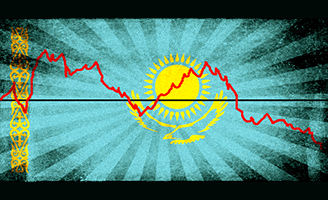CACI Analyst, May 27, 2015
Contents
Analytical Articles
THE SOUTHERN ENERGY CORRIDOR: A STRATEGIC PRIORITY FOR THE U.S.?, by Mamuka Tsereteli
ELECTION YEAR IN THE EURASIAN UNION AND THE EU'S EXTERNAL ACTION POLICIES, by Gaël Chataignère
MOSCOW STEPS UP PRESSURE ON CHECHNYA'S POWERFUL RULER, by Valeriy Dzutsev
THE CHALLENGES TO GEORGIA'S ENERGY SECTOR, by Ariela Shapiro
Field Reports
INGUSHETIA'S LEADER CLAIMS THE END OF INSURGENCY IN HIS REPUBLIC, by Huseyn Aliyev
GEORGIA FAILS TO OBTAIN VISA-FREE REGIME AT EaP RIGA SUMMIT, by Eka Janashia
ARMENIA'S AND GEORGIA'S PRIME MINISTERS IRON OUT RECENT STRAINS IN BILATERAL RELATIONS, byErik Davtyan
PARTY RESTRUCTURING IN KYRGYZSTAN PRIOR TO 2015 ELECTIONS, by Arslan Sabyrbekov
CACI Analyst, May 13, 2015
Contents
Analytical Articles
PAKISTAN AND AFGHANISTAN-INDIA COOPERATION, by Sudha Ramachandran
TURKEY, ARMENIA, AND THE POLITICS OF GENOCIDE RECOGNITION, by Emil Souleimanov
KAZAKHSTAN TO REFORM ITS CULTURAL SECTOR, by Rafis Abazov and Andrey Khazbulatov
WILL TURKISH STREAM COMPETE WITH THE SOUTHERN GAS CORRIDOR?, by Natalia Konarzewska
Field Reports
REPUBLICANS STRENGTHEN POSITION IN RESHUFFLED GEORGIAN GOVERNMENT, by Eka Janashia
KYRGYZSTAN TO HOLD ANOTHER CONSTITUTIONAL REFERENDUM, by Arslan Sabyrbekov
PRESIDENT SARGSYAN AND COUNTERPARTS COMMEMORATE ARMENIAN GENOCIDE, by Erik Davtyan
AZERBAIJAN CRACKS DOWN ON ACTIVISTS AHEAD OF EUROPEAN GAMES, by Mina Muradova
CACI Analyst, April 29, 2015
Contents
Analytical Articles
RUSSIA'S REGULATION OF LABOR MIGRATION SET TO HURT CENTRAL ASIAN ECONOMIES, by Nurzhan Zhambekov
MOSCOW CFE KILL THREATEN CAUCASUS STABILITY, by Richard Weitz
CAUCASUS EMIRATE FACES FURTHER DECLINE AFTER THE DEATH OF ITS LEADER, by Emil Aslan Souleimanov
KAZAKHSTAN AND NEIGHBORS SEEK STRATEGIES TO COUNTER EMERGING THREATS, by Jacob Zenn
Field Reports
KYRGYZSTAN'S PRIME MINISTER RESIGNS, by Arslan Sabyrbekov
ISLAMIC STATE REACHES OUT TO GEORGIA, by Eka Janashia
ARMENIA'S PRESIDENT VISITS THE VATICAN, by Erik Davtyan
AZERBAIJAN DEMOTED TO EITI CANDIDATE, by Mina Muradova
CACI Analyst, April 1, 2015
Contents
Analytical Articles
IRAN, A NUCLEAR TREATY, AND ITS NEIGHBORS, by Stephen Blank
THE PROSPECTS OF IS IN AFGHANISTAN, by Sudha Ramachandran
AZERBAIJAN AND KAZAKHSTAN FACE TOUGH ECONOMIC DECISIONS AMID DECREASING OIL PRICE, by Nurzhan Zhambekov
CONFLICT-RELATED VIOLENCE DECREASES IN THE NORTH CAUCASUS AS FIGHTERS GO TO SYRIA, by Huseyn Aliyev
Field Reports
KYRGYZSTAN'S PRESIDENT MAKES UNANNOUNCED VISIT TO MOLDOVA, by Arslan Sabyrbekov
PRIVATIZATION IN UZBEKISTAN: THE NEXT DOUBLE, by Umida Hashimova
ACUTE POLITICAL CONFRONTATION SIMMERS IN GEORGIA, by Eka Janashia
TAJIKISTAN'S OPPOSITION SUFFERS KIDNAPPINGS AND ASSASSINATIONS, by Oleg Salimov
Hanging in The Trade Balance: Is Free Trade a Curse for Kazakhstan?
By Sergei Gretsky (06/10/2015 issue of the CACI Analyst)
The creation of the Eurasian Economic Union (EEU) was presented as a vehicle for economic development of Belarus, Kazakhstan, and Russia as a result of the removal of barriers to free movement of goods, capital, and labor between the three states and creating a common market. Its inauguration on January 1, 2015, happened at a very inopportune moment as Russian economy, the largest of the three, was sharply contracting due to falling global commodity prices and western sanctions over Ukraine. Economic recession in Russia has had a negative ripple effect on Belarusian and Kazakhstani economies, which led some in Kazakhstan to second-guess the benefits of joining the EEU.




